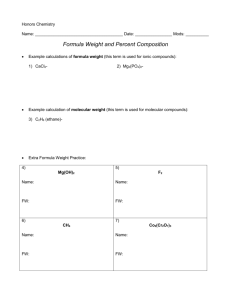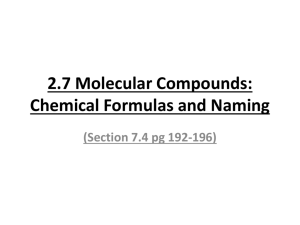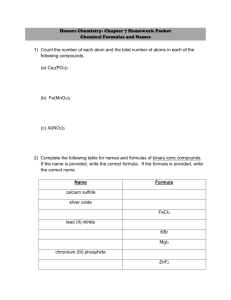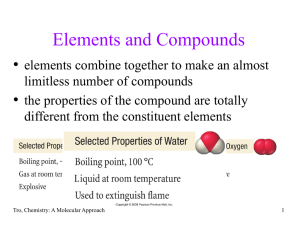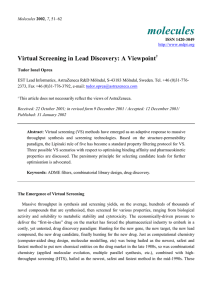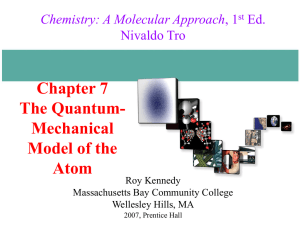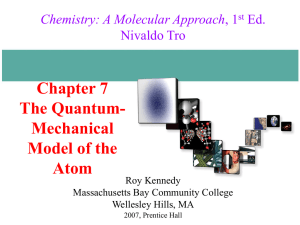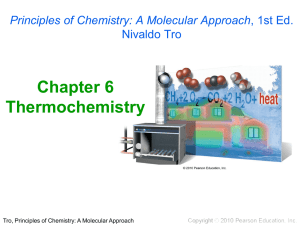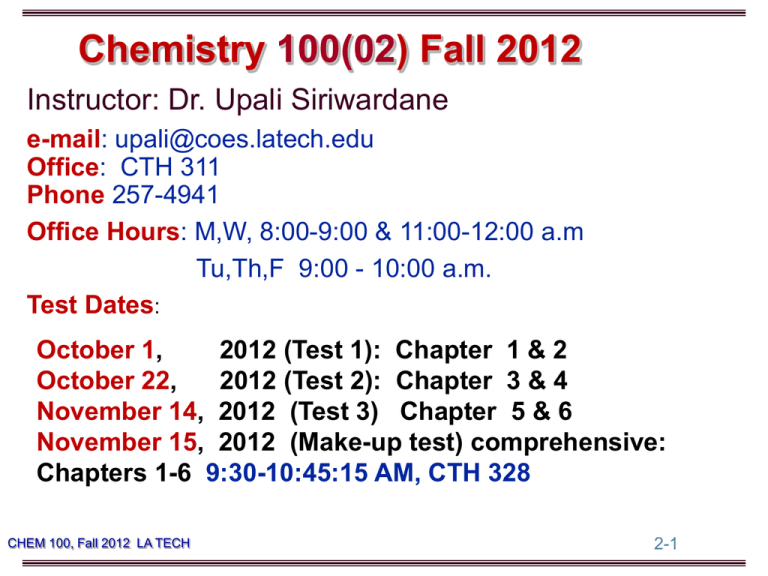
Chemistry 100(02) Fall 2012
Instructor: Dr. Upali Siriwardane
e-mail: upali@coes.latech.edu
Office: CTH 311
Phone 257-4941
Office Hours: M,W, 8:00-9:00 & 11:00-12:00 a.m
Tu,Th,F 9:00 - 10:00 a.m.
Test Dates:
October 1,
2012 (Test 1): Chapter 1 & 2
October 22,
2012 (Test 2): Chapter 3 & 4
November 14, 2012 (Test 3) Chapter 5 & 6
November 15, 2012 (Make-up test) comprehensive:
Chapters 1-6 9:30-10:45:15 AM, CTH 328
CHEM 100, Fall 2012 LA TECH
2-1
Text Book & Resources
REQUIRED :
Textbook: Principles of Chemistry: A Molecular Approach,
2nd Edition-Nivaldo J. Tro - Pearson Prentice Hall and also
purchase the Mastering Chemistry
Group Homework, Slides and Exam review guides and
sample exam questions are available online:
http://moodle.latech.edu/ and follow the course information
links.
OPTIONAL :
Study Guide: Chemistry: A Molecular Approach, 2nd EditionNivaldo J. Tro 2nd Edition
Student Solutions Manual: Chemistry: A Molecular
Approach, 2nd Edition-Nivaldo J. Tro 2nd
CHEM 100, Fall 2012 LA TECH
2-2
Chapter 3. Molecules, Compounds, and Chemical
Equations
3.1 Hydrogen, Oxygen, and Water…………………………….
3.2 Chemical Bonds……………………………………………
3.3 Representing Compounds: Chemical Formulas and Molecular Models..
3.4 An Atomic-Level View of Elements and Compounds……………..
3.5 Ionic Compounds: Formulas and Names……………………
3.6 Molecular Compounds: Formulas and Names………………………
3.7 Formula Mass and the Mole Concept for Compounds…………
3.8 Composition of Compounds……………………………..
3.9 Determining a Chemical Formula from Experimental Data………
3.10 Writing and Balancing Chemical Equations……………………
3.11 Organic Compounds……………………….
CHEM 100, Fall 2012 LA TECH
2-3
78
80
82
84
87
93
97
100
105
110
114
Chapter 4. Chemical Quantities and Aqueous Reactions
4.1 Global Warming and the Combustion of Fossil Fuels………………….
4.2 Reaction Stoichiometry: How Much Carbon Dioxide?.........................
4.3 Limiting Reactant, Theoretical Yield, and Percent Yield……………….
4.4 Solution Concentration and Solution Stoichiometry…………………..
4.5 Types of Aqueous Solutions and Solubility……………………………..
4.6 Precipitation Reactions……………………………………………………..
4.7 Representing Aqueous Reactions: Molecular, Ionic, and Complete Ionic
Equations………………………………………………………………….............
4.8 Acid–Base and Gas-Evolution Reactions…………………………….....
4.9 Oxidation–Reduction Reactions………………………………………….
CHEM 100, Fall 2012 LA TECH
2-4
127
128
133
140
146
150
153
155
162
Chapter 2. KEY CONCEPTS
•
•
•
•
•
•
•
•
•
•
•
•
Atom Imaging
Radioactivity
Subatomic Particles
Electrons
Electronic Charge
Nuclear atom Protons
Neutrons
Atomic number (Z)
Size of Atoms
Three chemical Laws
Dalton's atomic theory
Interpreting chemical formulas
and chemical reaction.
CHEM 100, Fall 2012 LA TECH
•
•
•
•
•
•
•
•
•
•
•
Isotopes
Isotopic symbols
Atomic Mass Units
Mass Spectrometer
isotope masses and %
composition?
Average atomic weights
Periodic Table
Abundance of Elements
Earth's Atmosphere
Concept of mole
Gram to mole conversion
2-5


